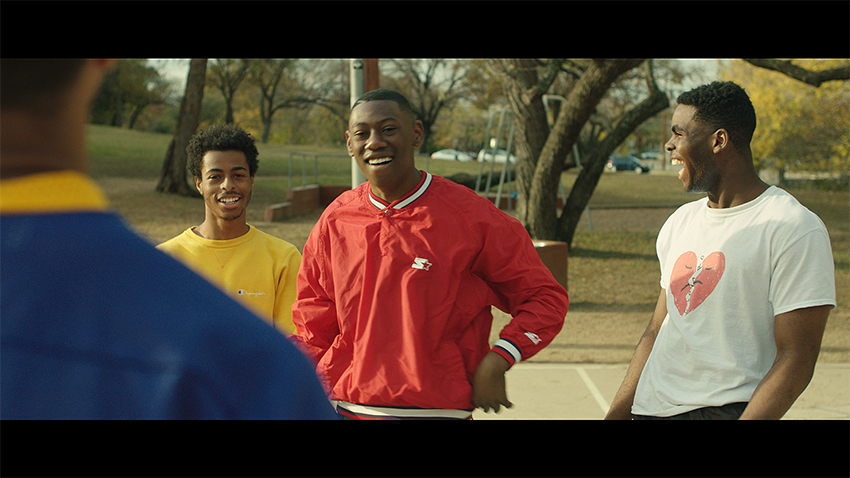It was July of last summer when acting senior Nyles Washington was staying on his friend’s couch in between apartment leases. On that couch, he wrote the short film that would later lead to the creation of a film production company with three other UT students.
Black Futon Films is a production company founded in September by Washington, acting senior Elias Weinberg, acting senior Rama Tchuente and American studies junior Alexis Roberts. Their first project, “Other Black Boys,” is a short film featuring a majority black cast and exploring topics of sexuality, race and other intersections of identity.
“The production company is dedicated to giving voices to the voiceless and showing alternative stories,” Washington said. “That’s where ‘Other Black Boys’ came from because I personally consider myself an alternative black kid. The film is about a sexually fluid man just trying to figure life out.”
Washington said the film is currently in the editing stage and will be finished by July. After submitting the short film to festivals, he said he hopes to later hold a screening of the film on campus.
“Eventually we want to make ‘Other Black Boys’ into a feature length film, which I’m currently writing the script for,” Washington said. “We hope someone will see the short (film) and pick it up so we are able to make the feature.”
In addition to this first short film, Washington said the production company is working on a couple of other projects, including an animated series and a series about what it is like to be a black millennial in today’s age.
“Black Futon Films will tell black stories in a different light,” Washington said. “You don’t really see people on screen talking about sexual fluidity, homophobia, transphobia and all of these different things.”
The company also wanted to give women and people of color opportunities both in front of and behind the camera, Washington said, by hiring a cast and crew mostly composed of people of color and women.
Washington said he hopes Black Futon Films can eventually be picked up by a network like Showtime or HBO, and he said he believes they will be working with the company for the next 20 years or so. For now, Washington is currently studying in Los Angeles through the UTLA program, which is exposing him to the film and entertainment industry.
“It’s important that people appreciate what’s happening on screen and also everything happening outside of the cinema world,” Washington said. “A lot of stories are being told for people who don’t understand, and it’s never too late to understand. It’s never too late to tell your homeboys to chill out with the homophobia. It’s never too late to correct a person who says something messed up.”
Roberts, who is one of the writers and editors for the production company, has been with Black Futon Films and working on “Other Black Boys” since the beginning.
“We wanted to write stories about people like us,” Roberts said. “The people that don’t fit into categories that are other black people.”
Roberts said there are a lot of typecast roles and not a variety of art for black artists, which leads to negative stereotypes for people of color.
“We found that we bonded over being alternative black people,” Roberts said. “In the mainstream society, there’s one way to be black, which is defined and created by white people, but also defined and created by black people as we hold ourselves to those same standards.”
For Roberts, “Other Black Boys” creates an important discussion on the awareness of black identity and negative stereotypes. Through the film, Roberts hopes others will re-evaluate their biases and open their minds to alternative images of black people.
“Some people will latch onto things about ‘wokeness’ but won’t actually be about it,” Roberts said.
Acting sophomore Brandon Pegram plays a main role in the cast of “Other Black Boys.” Pegram said the purpose of the film is to show that being whoever you want to be releases the shell that blackness creates around you.
“You don’t have to make yourself fit into a small box and sit in the corner,” Pegram said. “You can be as big as you want to be, you can be as authentic as you want to be. That’s the freedom acting gives you.”
Pegram said the cast and crew from “Other Black Boys” resemble each other and create a community, which makes the workload a lot easier. He said the film provides the students a chance to break away from UT’s campus culture, where being black still has its challenges.
“Being black at UT is like being black in America,” Pegram said. “Not much of a difference between academia and the real world.”
However, Pegram said there is a chance for black creatives to stick together and create opportunities here at UT. He said it is all about communication and reaching out to other black creatives to let them know that there is some help sought and needed in order to have UT’s black community grow together.
“The roles that are out there aren’t out there for us,” Roberts said. “So we are going to write our own roles.”






















